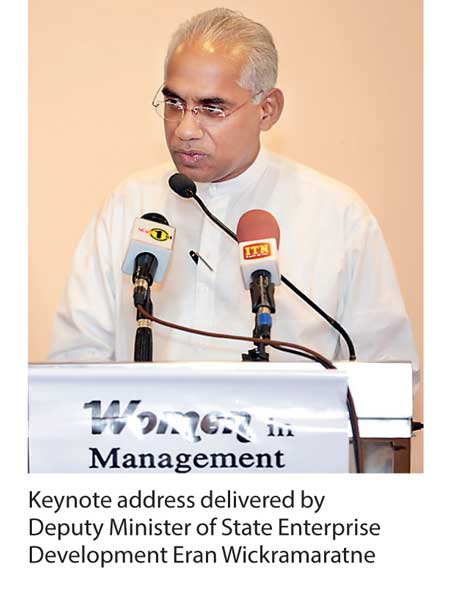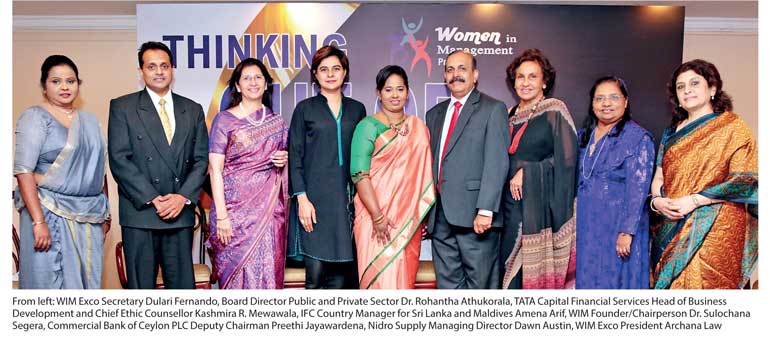Wednesday Feb 18, 2026
Wednesday Feb 18, 2026
Friday, 21 April 2017 00:00 - - {{hitsCtrl.values.hits}}
 Women in Management (WIM), dedicated to uniting Sri Lanka’s professional, career and entrepreneur women since its inception, successfully conducted a panel discussion on ‘Thinking out of the Gender Box’ on 28 March. Organised at Galadari Hotel, this event was graced by Deputy Minister of State Enterprise Development Eran Wickramaratne who delivered the keynote address and Ambassador of the Republic of Maldives to the Democratic Socialist Republic of Sri Lanka Zahiya Zareer.
Women in Management (WIM), dedicated to uniting Sri Lanka’s professional, career and entrepreneur women since its inception, successfully conducted a panel discussion on ‘Thinking out of the Gender Box’ on 28 March. Organised at Galadari Hotel, this event was graced by Deputy Minister of State Enterprise Development Eran Wickramaratne who delivered the keynote address and Ambassador of the Republic of Maldives to the Democratic Socialist Republic of Sri Lanka Zahiya Zareer.
The panellists were top industry leaders in the region: Nidro Supply Ltd. Managing Director Dawn Austin, Board Director Public and Private Sector Dr. Rohantha Athukorala, TATA Capital Financial Services Ltd. Business Development Head and Chief Ethic Counsellor Kashmira R. Mewawala, IFC Country Manager for Sri Lanka and Maldives Amena Arif and Commercial Bank of Ceylon PLC Deputy Chairman Preethi Jayawardena.
‘Thinking outside the box’ metaphorically means to think differently, unconventionally, or from a new perspective. In the context of gender equality what it symbolises is very real as we are taught to live within very rigid gender roles with social, psychological and even physical consequences for exploration outside.
Approaching the topic from unique perspectives, the experts felt that it is time to ease the pressure on women to try and cross gender lines, emphasising from global examples and personal narrations that ‘gender’ should not be misunderstood as being the promotion of women only. They reiterated that since gender relations are the ways in which a culture or society defines rights, responsibilities and even the identities of men and women in relation to one another, it was possible to introduce new game changing fundamentals as their own experiences amply illustrated.
Call it the ‘Pygmalion Effect’ or a corollary, the hardworking smart(er) do shine! The experts highlighted how they have risen in their professions and organisations, more than lived up to expectations. Despite multiple challenges, a clear message is that women leaders need to inspire other female leaders. With a firm belief in meritocracy, women professionals should ‘lean in’, ‘volunteer to accept responsibilities’, ‘step out of comfort zones’, establish ‘clear priorities’ and ‘release guilt about not doing enough’, build networks of mentors and supporters’ and ‘develop resilience’ while going through the learning curve.
Thus, while more formal support is needed to encourage women to scale up into leadership positions; men and boys can also find ways to support women by balancing domestic responsibilities, encouraging their development. Both the hardware and the software of nation as a whole, needs to be shaped with a gender-sensitive perspective continuously!